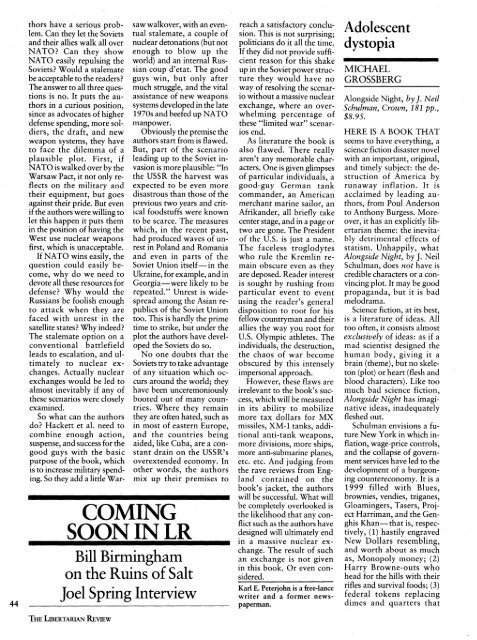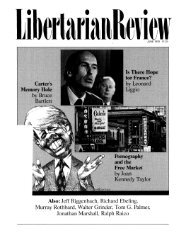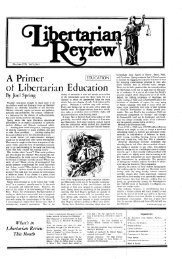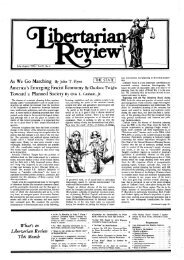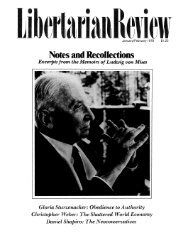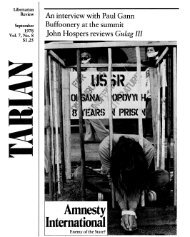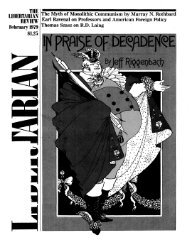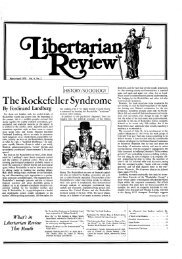44thors have a serious problem.Can they let the Sovietsand their allies walk all overNATO? Can they showNATO easily repulsing theSoviets? Would a stalematebe acceptable to the readers?<strong>The</strong> answer to all three questionsis no. It puts the authorsin a curious position,since as advocates of higherdefense spending, more soldiers,the draft, and newweapon systems, they haveto face the dilemma of aplausible plot. First, ifNATO is walked over by theWarsaw Pact, it not only reflectson the military andtheir equipment, but goesagainst their pride. But evenifthe authors were willing tolet this happen it puts themin the position of having theWest use nuclear weaponsfirst, which is unacceptable.If NATO wins easily, thequestion could easily become,why do we need todevote all these resources fordefense? Why would theRussians be foolish enoughto attack when they arefaced with unrest in thesatellite states? Why indeed?<strong>The</strong> stalemate option on aconventional battlefieldleads to escalation, and ultimatelyto nuclear exchanges.Actually nuclearexchanges would be led toalmost inevitably if any ofthese scenarios were closelyexamined.So what can the authorsdo? Hackett et aL need tocombine enough action,suspense, and success for thegood guys with the basicpurpose of the book, whichis to increase military spending.So they add a little Warsawwalkover, with an eventualstalemate, a couple ofnuclear detonations (but notenough to blow up theworld) and an internal Russiancoup d'etat. <strong>The</strong> goodguys win, but only aftermuch struggle, and the vitalassistance of new weaponssystems developed in the late1970s and beefed up NATOmanpower.Obviously the premise theauthors start from is flawed.But, part of the scenarioleading up to the Soviet invasionis more plausible: "Inthe USSR the harvest wasexpected to be even moredisastrous than those of theprevious two years and criticalfoodstuffs were knownto be scarce. <strong>The</strong> measureswhich, in the recent past,had produced waves of unrestin Poland and Romaniaand even in parts of theSoviet Union itself-in theUkraine, for example, and inGe<strong>org</strong>ia...,...-were likely to berepeated." Unrest is widespreadamong the Asian republicsof the Soviet Uniontoo. This is hardly the primetime to strike, but under theplot the authors have developedthe Soviets do so.No one doubts that theSoviets try to take advantageof any situation which occursaround the world; theyhave been unceremoniouslybooted out of many countries.Where they remainthey are often hated, such asin most of eastern Europe,and the countries beingaided, like Cuba, are a constantdrain on the USSR'soverextended economy. Inother words, the authorsmix up their premises toCOMINGSOON IN LRBill Birminghamon the Ruins ofSaltJoel Spring Interviewreach a satisfactory conclusion.This is not surprising;politicians do it all the time.If they did not provide sufficientreason for this shakeup in the Soviet power structurethey would have noway of resolving the scenariowithout a massive nuclearexchange, where an overwhelmingpercentage ofthese "limited war" scenariosend.As literature the book isalso flawed. <strong>The</strong>re reallyaren't any memorable characters.One is given glimpsesof particular individuals, agood-guy German tankcommander, an Americanmerchant marine sailor, anAfrikander, all briefly takecenter stage, and in a page ortwo are gone. <strong>The</strong> Presidentof the U.S. is just a name.<strong>The</strong> faceless troglodyteswho rule the Kremlin remainobscure even as theyare deposed. Reader interestis sought by rushing fromparticular event to eventusing the reader's generaldisposition to root for hisfellow countryman and theirallies the way you root forU.S. Olympic athletes. <strong>The</strong>individuals, the destruction,the chaos of war becomeobscured by this intenselyimpersonal approach.However, these flaws areirrelevant to the book's success,which will be measuredin its ability to mobilizemore tax dollars for MXmissiles, XM-l tanks, additionalanti-tank weapons,more divisions, more ships,more anti-submarine planes,etc. etc. And judging fromthe rave reviews from Englandcontained on thebook's jacket, the authorswill be successful. What willbe completely overlooked isthe likelihood that any conflictsuch as the authors havedesigned will ultimately endin a massive nuclear exchange.the result of suchan exchange is not givenin this book. Or even considered.Karl E. Peterjohn is a free-lancewriter and a former newspaperman.AdolescentdystopiaMICHAELGROSSBERGAlongside Night, by]. NeilSchulman, Crown, 181 pp.,$8.95.HERE IS A BOOK THATseems to have everything, ascience fiction disaster novelwith an important, original,and timely subject: the de-,struction of America byrunaway inflation. It isacclaimed by leading authors,from Poul Andersonto Anthony Burgess. Moreover,it has an explicitly libertariantheme: the inevitablydetrimental effects ofstatism. Unhappily, whatAlongside Night, by J. NeilSchulman, does not have iscredible characters or a convincingplot. It may be goodpropaganda, but it is badmelodrama.Science fiction, at its best,is a literature of idec;ls. Alltoo often, it consists almostexclusively of ideas: as if amad scientist designed thehuman body, giving it abrain (theme), but no skeleton(plot) or heart (flesh andblood characters). Like toomuch bad science fiction,Alongside Night has imaginativeideas, inadequatelyfleshed out.Schulman envisions a futureNew York in which inflation,wage-price controls,and the collapse of governmentservices have led to thedevelopment of a burgeoningcountereconomy. It is a1999 filled with Blues,brownies, vendies, tziganes,Gloamingers, Tasers, ProjectHarriman, and the GenghisKhan-that is, respectively,(1) hastily engravedNew Dollars resembling,and worth about as muchas, Monopoly money; (2)Harry Browne-outs whohead for the hills with theirrifles and survival foods; (3)federal tokens replacingdimes and quarters thatTHE LIBERTARIAN REVIEW
"To applaud a work offictiononly for its libertarian values is tobetray those values by swellingthe sphere ofpolitics until itengulfs the sphere ofesthetics."have been "greshamed" outof exchange; (4) gypsy cabdrivers; (5) religious fanaticswho believe that God is ahuman, on earth "at thisvery moment," but unfortunatelysuffering from amnesia;(6) nonlethal, purelydefensive, electrical-dartparalyzers; (7) a black marketlunar mining venture a laHeinlein; and (8) the latestrage in New Barbarian fashion:a coat of metallic-silverleather, trimmed with longblack monkey fur.Some of Schulman's bitsof fancy are refreshinglywitty, but one suspects this"novel of1999" just may bea parody of contemporarysociety. Cinema cabaretsshowing continuous-runHumphrey Bogart or MarxBrothers movies have replacedmost dinner theatres,stand-up comics, and dancebands, thanks to the nostalgiacraze and the proliferationof videodiscs and wallscreens.Popular televisionseries include PresidentialHealer, about a Presidentwho cures his subjects byfaith-healing, and Hello, Joe-Whaddya Know?, the adventuresof a gorilla namedJoe-the product ofprimateeducational research- whobecomes a philosophy professor.But Schulman's greatestflair is for the creative projectionof future libertarianinstitutions. He imagines ablack market so diversifiedthat an entire chain of secretshopping malls-variouslystyled Aurora, Autonomy,Auction, Austrian School,Aum, etc. (AU being the acronymof the Agorist Undergroundas well as thechemical symbol for gold)has grown, forming, quiteliterally, an undergroundeconomy. <strong>The</strong>se hiddenagoras, or marketplaces,offer a bustling labyrinth ofunusual facilities wherecountereconomic tradersmeet to do business: NoState Insurance, <strong>The</strong> ContrabandExchange, Identitiesby Charles (makeupand disguises), <strong>The</strong> AmericanLetter Mail Company(Lysander Spooner, founder),and <strong>The</strong> G. GeraldRhoames Border Guard andKetchup Company (a "cannabist"or marijuana salesman).Unlike the very worstsort of polemical novel, inwhich the action freezeswhile the characters expoundupon the author's philosophy,Alongside Nightpresents its libertarianismembedded in the very fabricof daily life:Fifth Avenue at night was evenbusier than in daytime.... Eachnight ... the avenue was closedoff to all motorized traffic exceptthe electric patrol carts ofFifth Avenue Merchant Alliance-andFAMAS had justifiedthe privilege. By totallyignoring any nonviolent, non-'invasive behavior-no matterhow outrageous or vulgarandconcentrating exclusivelyon protecting its clients andtheir customers from attacksand robbery, FAMAS madeFifth Avenue a safe haven fromthe city's pervasive street violence.Anything else went, fromsexual displays of every sorttothe street merchandising ofneo-opiates or - for severalhours, at least, your own personalslave....Nor was this discouraged bythe avenue's property owners.<strong>The</strong>y knew it was precisely thisatmosphere that attracted theircustomers. Neither did the citygovernment interfere; its ownOTB gambling casinos on theavenue were one of the city'sfew remaining reliable sourcesofrevenue-and more than onecity council member had secretbusiness interests in the enclave.... As a result, Fifth Avenue hadevolved into the center of thecity's nightlife.Yet Schulman's libertarianlandscapes remain onlypainted backdrops since thehero of Alongside Night, ElliotVreeland, fails to cometo life. And a multitude ofingenious little touches, nomatter how imaginative, donot add up to one absorbingtale, when the story itself isinherently· implausible. Sadto say, as an aspiring, futuristicpolitical adventurethriller, Alongside Night is abeautiful still life.For one thing, Elliot is atwo-dimensional character.We don't know more, orcare more, about him atnovel's end than at its beginning.Schulman shamelesslymanipulates his hero,resorting to that tired old sftrick of making him anElliot-in-Wonderland: aconveniently wide-eyed, wetbehind the ears innocentthat hack authors use toShow and Tell the ABC's oftheir illusive worlds. Believeit or not, the son of a worldfamousfree market economist,a student to whom"economics is ... a hobby,"doesn't seem to know the'first thing about elementarylibertarianism! Sophisticatedscience fiction tries tomake the· familiar strangeand the strange (to the readers)familiar (to the characters).By contrast, AlongsideNight is a doubtful world inwhich the natives act liketourists, shocked by thefamiliar institutions andcustoms of their own timeand place!We are also expected toswallow a storyso contrivedit depends on a series of unlikelycoincidences. Elliot, asenior at a classy Manhattanprep school, is catapultedinto the forefront of a revolutionaryconspiracy whenhis family disappears, abductedby the State, and Elliotsets out to find them.One day he's turning inhomework assignments on"<strong>The</strong> Self-Destruction oftheCapitalist System;" overnighthe's transformed intoa savior of free enterprise.He's inallthe right placesat all the right times. Thrustby "accident" into a Citizensfor a Free Society rally,Elliot becomes the catalystfor a riot that prompts EUCOMTO (the new laissezfaireEuropean CommonMarket) to stop the exchangeof New Dollars foreurofrancs, a move which inturn ushers in the fall of theAmerican State. If only currentlibertarian demonstrationshad such impact!In short, Alongside Nightis impossible to take seriouslyas adult literature. Butwait. That's it! An adultcouldn't take this melodramaseriously ... butmaybe an adolescent can.Put yourself in Elliot's placeJor a moment. Imagine.Your own high school is ex:posed as the national headquartersof an anarchistconspiracy! Your hatedteacher is unmasked as agovernment agent, sent especiallyto spy on you! Yourbest friend proves to be theson of the guerrilla leader ofthe Revolutionary AgoristCadre! Your girlfriendLorimer, the very firstwoman you met inthe AgoristUnderground-turns outto be the daughter ofthe villainouschief of the Americansecret police! To top itall off, your own father isacknowledged by the wholeworld to be the Last BestHope for Mankind - andyou are his LastBestHope!!What we have here is atypically hyperinflated adolescentwet dream. Elliotacts out a Walter Mittywish-fulfillment fantasy easilyshared by today's generationof latently libertarianteenagers: young people fedup with compulsory publicschools and a corrupt government,suspicious.of· theestablishment, and lookingfor answers. AlongsideNight is an unconsciouslywritten juvenile science fic-45 ,MARCH <strong>1980</strong>
- Page 6 and 7: 6of which Taraki and Aminwere membe
- Page 8 and 9: succession of client regimesinKabul
- Page 10 and 11: ~\~~,{AP!10Of windfallsand bailouts
- Page 12 and 13: 12JEFFREY SANCHEZ& ROYA. CHILDS,jR.
- Page 14: JEFF RIGGENBACHThere is a serious p
- Page 18 and 19: ~nwdrl~~O/hood [which] implies an a
- Page 20 and 21: 20fully reflect the old-the English
- Page 22 and 23: 22better with his essays in prose.
- Page 24 and 25: and Ann Radcliffe. And, as was the
- Page 26 and 27: "Obviously, they did not always tak
- Page 28 and 29: Let us con'sider, briefly, one case
- Page 30 and 31: 30Norman PodhoretzMarchinginstep'RO
- Page 32 and 33: 32nism and Its Friends,"by Walter L
- Page 34 and 35: in Commentary one of themost loaths
- Page 36 and 37: 36and Justice William O.Douglas too
- Page 38 and 39: 38ions as you choose."The statement
- Page 40 and 41: 40gone on for generations, asthe fo
- Page 42 and 43: 42see what I haddone, and thepressu
- Page 46 and 47: 46tion novel, .an attempt toportray
- Page 48 and 49: 48the Russian Embassy by thewife of
- Page 50 and 51: 50CLASSIFIED ADVERTISEMENTS are acc
- Page 52: LAISSEZ FAIRE BOOKSlibertarianRevie


